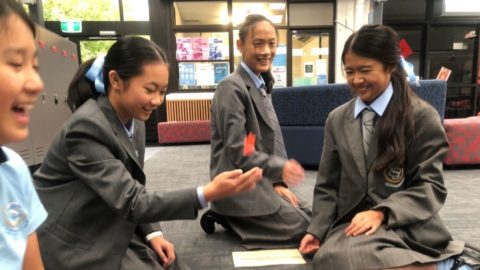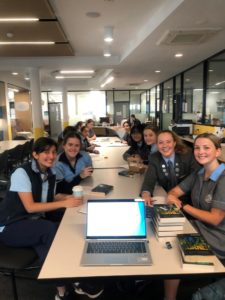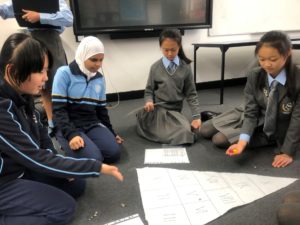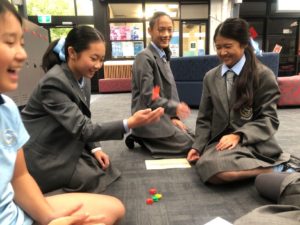Library Update – enabling varied learning experiences

 Nicholas Library has seen a busy start to Term 2, hosting a range of activities in the library. The library staff are invested in enabling varied learning experiences in our space and welcoming Co-curricular clubs. The Nicholas Library is committed to adapting to the changing needs of the School, always prioritising student learning.
Nicholas Library has seen a busy start to Term 2, hosting a range of activities in the library. The library staff are invested in enabling varied learning experiences in our space and welcoming Co-curricular clubs. The Nicholas Library is committed to adapting to the changing needs of the School, always prioritising student learning.
One of our key objectives is to foster the love of reading through activities such as Book Club. It has been a pleasure to see the Book Club double in size between Terms 1 and 2. For the first meeting in Term 2 we held a Literary Trivia Quiz to challenge our keen readers on the breadth of their reading. It was also ‘bring a friend’ day, which enabled members of the Club to share their love of books with their peers. In our own version of Hard Quiz, the girls faced tricky questions on a wide range of literature for all ages, ranging from Eric Carle’s The Very Hungry Caterpillar through to Shakespeare and Dickens. In true competitive spirit the teams battled for supremacy amid exclamations of, “I’ve read that!” or “I know this!”. Congratulations go to Ava Colosimo and Phoebe Russell of Year 10 who made an awesome team and whose combined knowledge earned them the winning place.
 On Monday 3 May we were delighted to welcome Anna Ciddor, author and illustrator of The Boy who Stepped Through Time and her consultant historian and archaeologist, Tamara Lewit, for a presentation and workshop for the Year 7 cohort. In the Nicholas Library we are always striving to keep connections between the library and the wider curriculum strong. To this end, Ms Ciddor’s latest time travel novel, set during the Roman Empire, provided learning opportunities relevant to both the English and Humanities curricula.
On Monday 3 May we were delighted to welcome Anna Ciddor, author and illustrator of The Boy who Stepped Through Time and her consultant historian and archaeologist, Tamara Lewit, for a presentation and workshop for the Year 7 cohort. In the Nicholas Library we are always striving to keep connections between the library and the wider curriculum strong. To this end, Ms Ciddor’s latest time travel novel, set during the Roman Empire, provided learning opportunities relevant to both the English and Humanities curricula.
 The workshop included some immersive historical activities where the girls were able to try their hands at a range of games that were popular in Ancient Rome. They enthusiastically learned the basics of ‘knucklebones’ and ‘nuts’ and attempted to solve ancient riddles. Ms Ciddor also spoke about the writing and drafting process, the importance of historical accuracy when writing about a past era, and word choice to create mood and build a character. The students were then afforded the opportunity to help edit a paragraph of the novel by suggesting alternative vocabulary to change the mood, or reflect an aspect of a character’s personality. Many girls were surprised by the meticulous attention to detail that was needed to prepare a book for publication; one of the more complex illustrations in the novel requiring 32 drafts to ensure complete historical accuracy. When asked how long it took for Ms Ciddor to complete a novel, the girls were intrigued that it could take anywhere from two to five years, involving multiple drafts. This provided valuable insights into the work of an author, while also impressing on the girls the importance of drafting and editing written work.
The workshop included some immersive historical activities where the girls were able to try their hands at a range of games that were popular in Ancient Rome. They enthusiastically learned the basics of ‘knucklebones’ and ‘nuts’ and attempted to solve ancient riddles. Ms Ciddor also spoke about the writing and drafting process, the importance of historical accuracy when writing about a past era, and word choice to create mood and build a character. The students were then afforded the opportunity to help edit a paragraph of the novel by suggesting alternative vocabulary to change the mood, or reflect an aspect of a character’s personality. Many girls were surprised by the meticulous attention to detail that was needed to prepare a book for publication; one of the more complex illustrations in the novel requiring 32 drafts to ensure complete historical accuracy. When asked how long it took for Ms Ciddor to complete a novel, the girls were intrigued that it could take anywhere from two to five years, involving multiple drafts. This provided valuable insights into the work of an author, while also impressing on the girls the importance of drafting and editing written work.


